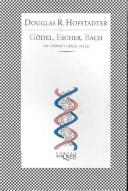A walk by wonderland
5 stars
This is my all-time favorite book.
It feels like you are wandering in a place full of wonders and understanding many things that seemed unrelated, while enjoying the company of the author and his quirky creations.

Paperback, 256 pages
Spanish language
Published Oct. 11, 2007 by Tusquets.
Gödel, Escher, Bach: an Eternal Golden Braid, also known as GEB, is a 1979 book by Douglas Hofstadter. By exploring common themes in the lives and works of logician Kurt Gödel, artist M. C. Escher, and composer Johann Sebastian Bach, the book expounds concepts fundamental to mathematics, symmetry, and intelligence. Through short stories, illustrations, and analysis, the book discusses how systems can acquire meaningful context despite being made of "meaningless" elements. It also discusses self-reference and formal rules, isomorphism, what it means to communicate, how knowledge can be represented and stored, the methods and limitations of symbolic representation, and even the fundamental notion of "meaning" itself. In response to confusion over the book's theme, Hofstadter emphasized that Gödel, Escher, Bach is not about the relationships of mathematics, art, and music—but rather about how cognition emerges from hidden neurological mechanisms. One point in the book presents an analogy about how individual …
Gödel, Escher, Bach: an Eternal Golden Braid, also known as GEB, is a 1979 book by Douglas Hofstadter. By exploring common themes in the lives and works of logician Kurt Gödel, artist M. C. Escher, and composer Johann Sebastian Bach, the book expounds concepts fundamental to mathematics, symmetry, and intelligence. Through short stories, illustrations, and analysis, the book discusses how systems can acquire meaningful context despite being made of "meaningless" elements. It also discusses self-reference and formal rules, isomorphism, what it means to communicate, how knowledge can be represented and stored, the methods and limitations of symbolic representation, and even the fundamental notion of "meaning" itself. In response to confusion over the book's theme, Hofstadter emphasized that Gödel, Escher, Bach is not about the relationships of mathematics, art, and music—but rather about how cognition emerges from hidden neurological mechanisms. One point in the book presents an analogy about how individual neurons in the brain coordinate to create a unified sense of a coherent mind by comparing it to the social organization displayed in a colony of ants.Gödel, Escher, Bach won the Pulitzer Prize for general non-fiction and the National Book Award for Science Hardcover.
This is my all-time favorite book.
It feels like you are wandering in a place full of wonders and understanding many things that seemed unrelated, while enjoying the company of the author and his quirky creations.
Ich habe dieses gehypte Buch voller positiver Erwartung begonnen und bin bitter enttäuscht worden. Es ist unglaublich langweilig und für mich inhaltlich total irrelavant, abgesehen davon, das ich nix verstanden habe. Ist wohl nur etwas für Mathe-Nerds. Nach 100 Seiten habe ich aufgegeben.
Ich habe dieses gehypte Buch voller positiver Erwartung begonnen und bin bitter enttäuscht worden. Es ist unglaublich langweilig und für mich inhaltlich total irrelavant, abgesehen davon, das ich nix verstanden habe. Ist wohl nur etwas für Mathe-Nerds. Nach 100 Seiten habe ich aufgegeben.
beh, mi lessi la prima edizione della traduzione (quella che costava sessantamila lire vent'anni fa...) e mi dissi "come diavono sono riusciti a tradurlo?" (non per nulla ci si erano messi in cinque)
Garantisco che lo si può leggere anche in italiano, e che è semplicemente troppo bello.
Consiglio per i pavidi: iniziate dai dialoghi, e lasciate per il momento da parte il resto.
beh, mi lessi la prima edizione della traduzione (quella che costava sessantamila lire vent'anni fa...) e mi dissi "come diavono sono riusciti a tradurlo?" (non per nulla ci si erano messi in cinque)
Garantisco che lo si può leggere anche in italiano, e che è semplicemente troppo bello.
Consiglio per i pavidi: iniziate dai dialoghi, e lasciate per il momento da parte il resto.